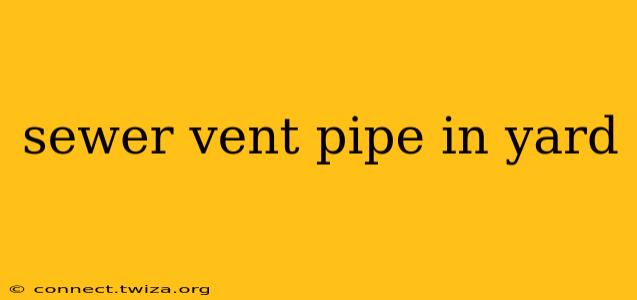A sewer vent pipe in your yard might seem like an unwelcome intrusion, a mysterious pipe sticking up from the ground. However, this seemingly innocuous pipe plays a vital role in your home's plumbing system. Understanding its purpose and potential issues is crucial for maintaining a healthy and functioning sewage system. This guide will delve into the function of sewer vent pipes, common problems, and how to address them.
What is a Sewer Vent Pipe?
A sewer vent pipe, also known as a stack vent or soil stack vent, is an essential component of your plumbing system. Its primary function is to allow sewer gases to escape outside, preventing them from backing up into your home. These gases, a byproduct of the decomposition of organic matter in the sewer line, can be unpleasant, and in high concentrations, even harmful. The vent pipe also equalizes air pressure within the drainage system, allowing wastewater to drain efficiently. Without a properly functioning vent, drains could gurgle, drain slowly, or even back up completely.
Why is my sewer vent pipe in my yard?
The location of your sewer vent pipe often depends on the layout of your house and plumbing system. It's typically placed in the yard to maintain a safe distance from living areas and ensure proper ventilation. Placing it in the yard minimizes the risk of sewer gases entering your home through other points in the plumbing system. Some homes might have the vent pipe extending from the roof, but yard placement is common, especially in older homes or those with specific plumbing configurations.
What are the common problems with sewer vent pipes?
Several issues can arise with sewer vent pipes in the yard, impacting the efficiency of your drainage system and potentially creating unpleasant or even hazardous situations.
1. Clogs and Blockages:
Leaves, debris, and small animals can occasionally block the vent pipe, reducing its effectiveness. A blocked vent can lead to slow drains, gurgling sounds, and even sewer backups in your house.
2. Damage or Deterioration:
Over time, sewer vent pipes, especially those made of older materials, can corrode or crack. This can lead to leaks, further contributing to potential sewage backups and ground contamination. Exposure to the elements accelerates this deterioration.
3. Incorrect Installation:
Improper installation of the vent pipe can render it ineffective or even cause problems. A poorly installed pipe may not provide adequate ventilation, or it may leak, leading to the issues discussed above.
4. Animal Infestation:
Rodents and other animals sometimes use vent pipes as access points to your home's plumbing system. This can create unsanitary conditions and lead to additional clogs and blockages.
How do I know if my sewer vent pipe is causing problems?
Several signs can indicate a problem with your sewer vent pipe:
- Slow-draining drains: This is a major indicator that the vent isn't functioning correctly.
- Gurgling or bubbling sounds from drains: These noises indicate air pressure imbalances in the drainage system, a common symptom of vent issues.
- Sewer odors in your home: The presence of sewer gas indoors is a clear sign that the vent pipe is not working effectively.
- Sewer backups: This is the most severe symptom, often requiring immediate professional attention.
How to maintain my sewer vent pipe?
Regular maintenance can help prevent many problems associated with sewer vent pipes. While you shouldn't attempt major repairs yourself, simple maintenance can make a big difference:
- Regular inspection: Periodically check the pipe for any visible signs of damage, blockages, or animal activity.
- Keep the area around the pipe clear: Remove leaves, debris, and other obstructions that might block the pipe.
- Protect the pipe from damage: Consider placing a protective cover around the pipe's base to help prevent damage from lawnmowers or other equipment.
When should I call a plumber?
If you notice any of the problems mentioned above, it's best to contact a qualified plumber. Attempting DIY repairs on a sewer vent pipe can sometimes worsen the problem, leading to costly and extensive repairs. A plumber has the expertise and tools to properly diagnose and address any issues with your sewer vent pipe, ensuring the efficient and safe operation of your home's plumbing system. Ignoring problems can lead to significant damage and health risks.
This guide provides a comprehensive overview of sewer vent pipes in yards. Remember, proactive maintenance and prompt professional attention to any issues are crucial for maintaining a healthy and functioning plumbing system in your home.
